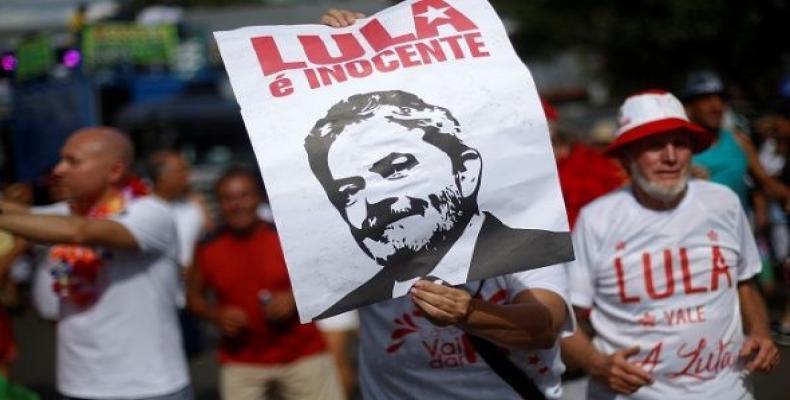Brasilia, September 10 (RHC)-- Newly-leaked chats between Brazil’s chief prosecutor Deltan Dallagnol in the Lava Jato case and other federal servants show that the prosecution deliberately released selected audios that only served to reinforce the hypothesis that Lula da Silva had accepted a cabinet position in Dilma Rousseff’s administration to obstruct justice, omitting other audios that proved the contrary.
The report was released by Folha de São Paulo and The Intercept Brazil, as part of an ongoing investigation that proves the illegality and political motivations behind Operation Car Wash (Lava Jato) task force against Lula and the Worker’s Party (PT).
These latest leaks show that the Lava Jato prosecutors, after illegally tapping telephone conversations between then-president Dilma Rousseff and Lula in 2016, hand-picked audios and delivered them to the press to give the impression that Dilma was trying to use the appointment of Lula as Chief of Staff, and thus the special legal jurisdiction gained, as a shield against investigations of Lava Jato.
In the conversations, Dallagnol arranges with prosecutors Carlos Fernando Santos, Paulo Roberto Galvão, and with a Federal Police agent Igor Romario de Paula on how audios should be delivered to journalists from Globo TV, and the “right” time to be shown on the evening prime time news.
"If we are going to do that, we must do it later, in time to generate the consequences, even so, that Janot (referring to Rodrigo Janot, comptroller general) can ask for explanations from Eugênio (a reference to Eugênio Aragão, then Minister of Justice)”, Galvão said.
The illegal phone tap is even acknowledged by Dallagnol in the leaks but the chief prosecutor then green lights the release in their bid to manipulate the trial against Lula. Conversations show that Lula's intention was not to protect himself, he wanted to ensure governance, which would be lawful and normal. But parts were selected and conversations were omitted to manipulate public opinion.
Yet the leaked conversation shows that prosecutors did not deliver all audios to the press, but only those who corroborated their thesis, and hid those in which Lula da Silva said he didn’t want to use the position to get rid of justice but to end the political crisis Dilma’s administration was facing, a claim that Lula maintained during his hearing.
According to the report, the former president told advisers, in some of the hearings, that his purpose was to reconcile Dilma and Michel Temer, then vice president, who would on August 31 that year, in 2016, lead a coup against Dilma.
The new leaks are one of the most important since the first releases were done by the Intercept on June 9, 2019, as they would prove that the prosecution and then-judge Sergio Moro desperately needed to keep the trial under their jurisdiction in the Curitiba court. As the only thing that would have changed if Lula assumed the ministerial post, was that the case would’ve been automatically transferred to the Supreme Federal Court and to the Comptroller General Rodrigo Janot in Brasilia, out of the hands of Moro and the Lava Jato team.
The report “helps reconstruct historical truth and exposes the gross illegalities practiced by former judge Sergio Moro and Lava Jato prosecutors,” according to Lula’s attorneys Cristiano Zanin Martins and Valeska Zanin Martins.
Lula’s defense is now waiting for the habeas corpus hearing that was suspended on June 25, 2019.
The habeas corpus was presented by Lula's defense last year when then-judge Sergio Moro accepted Brazilian President Jair Bolsonaro’s appointment to lead the Justice Ministry. The procedure had already entered the agenda of the Supreme Court on December 2018, yet the trial was suspended on December 4th after Mendes requested a hearing.
At the time of the halt, the score was two votes against by Fachin and Lucia, with Mendes, de Mello, and Lewandowski still having to vote. The Supreme Court has announced the hearing will take place in the coming months.
Lula was convicted on July 2017 in the first of at least eight corruption trials he faces. He was jailed on April 2018 and remains in prison. He has since been convicted in a second graft trial.
Moro ruled against Lula and rendered him ineligible to run in the 2018 presidential election at a time when all polls showed that the former president was the clear frontrunner. This gave far-right Jair Bolsonaro a strong lead that resulted in his presidency win.
The new president then, according to many, “rewarded” Moro by creating an unprecedented powerful position now called the “super justice minister”, which has complete control over all the judicial branch, policing and social control in Brazilian society.


